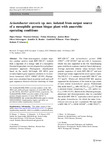Acinetobacter stercoris sp. nov. isolated from output source of a mesophilic german biogas plant with anaerobic operating conditions
Pulami, Dipen
Schauss, Thorsten
Eisenberg, Tobias
Blom, Jochen
Schwengers, Oliver
Bender, Jennifer K
Wilharm, Gottfried
Kämpfer, Peter
Glaeser, Stefanie P.
The Gram-stain-negative, oxidase negative, catalase positive strain KPC-SM-21T, isolated from a digestate of a storage tank of a mesophilic German biogas plant, was investigated by a polyphasic taxonomic approach. Phylogenetic identification based on the nearly full-length 16S rRNA gene revealed highest gene sequence similarity to Acinetobacter baumannii ATCC 19606T (97.0%). Phylogenetic trees calculated based on partial rpoB and gyrB gene sequences showed a distinct clustering of strain KPC-SM-21T with Acinetobacter gerneri DSM 14967T = CIP 107464T and not with A. baumannii, which was also supported in the five housekeeping genes multilocus sequence analysis based phylogeny. Average nucleotide identity values between whole genome sequences of strain KPC-SM-21T and next related type strains supported the novel species status. The DNA G + C content of strain KPC-SM-21T was 37.7 mol%. Whole-cell MALDI-TOF MS analysis supported the distinctness of the strain to type strains of next related Acinetobacter species. Predominant fatty acids were C18:1 ω9c (44.2%), C16:0 (21.7%) and a summed feature comprising C16:1 ω7c and/or iso-C15:0 2-OH (15.3%). Based on the obtained genotypic, phenotypic and chemotaxonomic data we concluded that strain KPC-SM-21T represents a novel species of the genus Acinetobacter, for which the name Acinetobacter stercoris sp. nov. is proposed. The type strain is KPC-SM-21T (= DSM 102168T = LMG 29413T).
Files in this item

